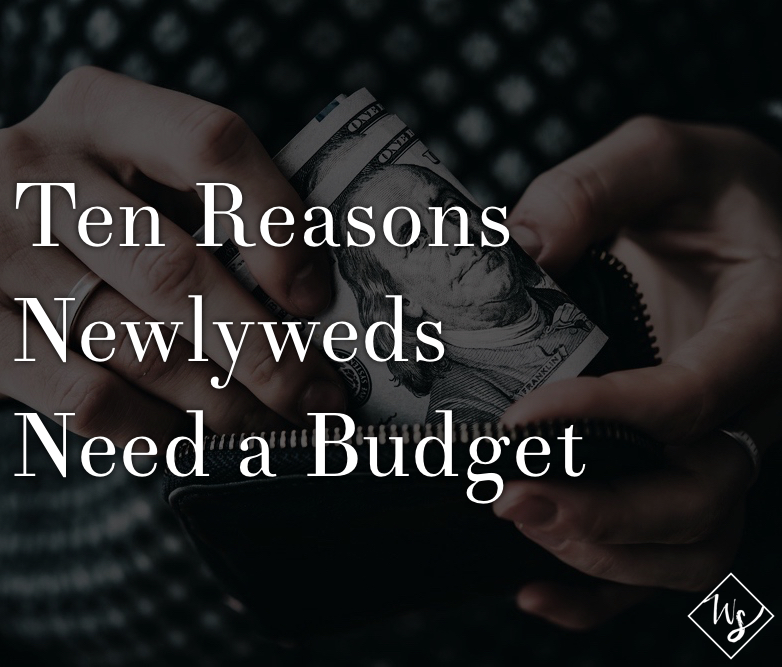You and the love of your life just got home from your honeymoon. You were on a plane all day, and the free ginger ale and honey roasted peanuts left you unsatisfied. Naturally, you order Chinese—Crispy Sesame Chicken and Crab Rangoons to be exact. But when the delivery guy asks for his $25, you look at each other blankly until you realize that you haven’t had a reason to discuss your joint finances until this very moment.
The delivery guy didn’t realize the significance of that perfectly sweet and tangy chicken in his hands…but neither did you.
Some newlyweds don’t talk about their budget until moments like these. Others make a thorough financial plan during their engagement. The discussion is inevitable, but how you and your partner choose to handle your finances moving forward is totally up to you.
There are certainly some big money mistakes to avoid, but the general methods of budgeting vary from couple to couple and depend on your incomes, habits and histories. So why is is absolutely necessary that you and your new spouse create a budget? Well, over 50% of divorced couples cited money-related issues as the primary cause for their split, so being intentional about your finances truly could save your marriage.
Managing money together offers so much more than organization and predictability—budgets teach essential skills that you didn’t even know you needed. Here are the ten reasons newlyweds absolutely need a budget.
1. It helps you to become expert-level collaborators. After you have the preliminary conversations around how you’ll organize your bank accounts, you’ll have to work together to form a working budget. It’s no small task to develop a detailed process that you mutually respect and maintain. Your budget will teach you how to collaborate on a task, a skill you’ll need ’til death do you part.
2. It offers a healthy accountability. Not only will you become familiar with each other’s habits, but you’ll be required to talk about the expenses that are excessive or unnecessary. When one of you neglects to stick to it, you’ll have an opportunity to discuss the boundaries you established together. Your budget will teach you how to gently, but firmly, hold each other accountable.
3. It teaches you conflict management skills. Your budget will require you to bring up touchy subjects with love and to be nice when you talk about your partner’s spending habits. It’s easy to disagree or feel frustrated with your new spouse when it comes to money—it’s such a big part of your daily lives. Your budget will teach you how to approach conflict in a healthier and more productive way.
4. It gives you a reason to celebrate the small things. You pay off your college credit card, save $350 to adopt a new puppy, or cook a meal together instead of eating out. These are all little victories that are worth being celebrated, and keeping a close eye on your finances allows you to see them in all their glory. Your budget will teach you how to celebrate even the smallest victories together so that you experience the fullness of each one.
5. It highlights your new partnership. You’re not just an individual anymore—you’re also one half of a partnership. Once you create a budget, you’ll have to share the responsibilities for maintaining it and decide on your roles. This will reveal your dependence on each other in a unique way since neither one of you is 100% responsible for it. Your budget will teach you how to depend on someone else.
6. It keeps surprises to a minimum. Everyone knows that stress isn’t good for a marriage, so taking preventative measures is key. Obviously you can’t predict every major issue you’ll run into…I’m sorry, what do you mean the toilet exploded…but you can create an emergency fund to ease the pain when they do come. Your budget will teach you how to plan for the unexpected and how to roll with the punches when surprises happen anyway.
7. It preserves your independence. It’s important that you and your partner both maintain your individual identities as you join your lives together. One way to do this is to work in individual “allowances” that allow you both to make independent money decisions within your joint budget. Your budget will each you how to act as an individual even as you learn how to be one half of a lifelong partnership.
8. It reveals your priorities. When you keep a close eye on your spending and saving habits, you’ll get a good idea of what you and your partner consider important. For example, if you spend a lot on gym memberships and healthy food, you prioritize your health. But when was the last time you splurged for a date night or a marriage retreat? Your budget will teach you where your priorities lie, and if your marriage isn’t one of them, you’ll know.
9. It gives you a reason to catch up every week. One of the best practices for maintaining a budget is to meet weekly to discuss where you’re at and where you’re headed. This will keep you clued into each others needs, both financial and personal. You could even create a list of check-in questions for this weekly meeting if you’re not sure where to start. Your budget will teach you how to stay tuned into your finances and your marriage on a regular basis.
10. It helps you begin setting long-term goals. Dreaming about the future is one of the most enjoyable parts of being a newlywed. And when you create a budget, planning for the future is a must. You can discuss how you want to pay off debt, what percentage of your income you want to save and even the goals you have for retirement. Your budget will teach you how to dream about and plan for your future.
There are plenty of money tips for newlyweds out there, but being intentional about your finances from the very beginning is critical. Even if you don’t think you and your partner need a budget, seek advice from people who have been married longer than you and do your research, then, reconsider. Don’t wait until that steamy Sesame Chicken arrives at your doorstep to think about it—your budget has so much to teach you if you’ll let it.
Loved this post? Save it for later with the pin below.








